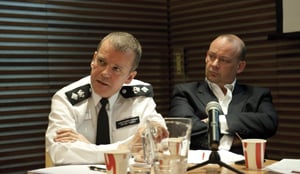Better believe it
Julia Farrington argues that we need better support for courageous and controversial artists, or risk losing them and their art

In July, Index on Censorship held a half day conference ‘Beyond Belief – Policy, Policing and Freedom of Expression in the arts’. This was to launch our case study about the premiere of Gurpreet Kaur Bhatti’s play ‘Behud – Beyond Belief’ at the Belgrade Theatre Coventry in 2010. ‘Behud’ is Kaur Bhatti’s imaginative response to the events that led to the cancellation of her previous play, ‘Behzti’, at the Birmingham Rep in 2004. Our study looks behind the scenes at the negotiations deemed necessary to ensure the safe delivery of a play that could potentially be seen as controversial. Central to this is the relationship with the Coventry Police, who, following their assessment of the potential risk to public order that the play with its troubled past represented, asked the theatre to pay £10,000 per night to cover their costs. Although the fee was later waived, it raised questions about policing duty, in particular why policing of political protest is considered to be core, while policing of artistic freedom of expression is seen to be discretionary and potentially subject to service charges.
The conference provided a platform to explore these themes further. Jude Kelly OBE (Artistic Director of the Southbank Centre) delivered the key note speech, which was followed by a panel discussion, ‘Policing Challenging Art’ featuring speakers from every side of the debate: Chief Superintendant Peter Terry, Head of Public Order at the Metropolitan Police; Tamsin Allen, Partner at Bindman’s LLP; Munira Mirza, Director of Cultural Policy at City Hall; David Lan, Artistic Director at the Young Vic; and Canon Giles Fraser of St Paul’s Cathedral. We invited delegates who came from across the arts, religion, law, policy and policing to further investigate and feed back on the recommendations that came out of the case study. It was a fascinating and informative morning.
Freedom of expression in the arts emerged as under-nourished. A particular form of censorship has gradually established itself over the past 20 years, in which artistic freedom has been losing to competing demands of audience rights, creating a climate of caution around presenting work that may provoke or offend. This form of censorship was thought to be endemic across our institutions, including local authorities and the police, and there was an appetite at the conference for a deeper understanding in order to challenge it. There was a clear call for information about rights and responsibilities designed specifically for the arts sector to lay out clearly the existing human rights legislation, with advice on how to support the rights of the artist if public authorities, private companies or the press object to a piece of work and call for its removal. It was also established that there is indeed work to be done on the guidelines around the policing of cultural events, to ensure that the right to freedom of expression in the arts is no different from the right to protest in this regard. In general it was felt that if we want to have a dynamic culture which supports the artist to create challenging and relevant art then the sector needs to assert artists’ rights more robustly, or risk losing them.
How does all this sound now when pitched against the backdrop of the shocking events that took place in early August? Has the landscape changed so completely that these ideas and plans have to be kicked into the long grass until we have addressed more pressing concerns? Or has the fact that the debate about rights and public order has shot to the top of the political agenda created exactly the conditions needed to press the case outlined above?
I would argue for the latter. Rather than wait in the wings for the big players to set the scene, we need to recognise that the arts have an integral part to play in this debate. Arts are the expression of human experience and as such we need them now more than ever, to help us make sense of what is happening from a human and not only a political perspective. Cameron is calling for an end to “twisting and misrepresenting” human rights and I agree with him that we need to “fight to ensure people understand the real scope of these rights”. This means more freedom of expression not less, reinforced by better information about our rights and responsibilities, because it is the best tool of social cohesion we have. In our plural society we need artists to keep imagining and creating worlds where it is possible to discuss even the most uncomfortable truths so that ignorance, prejudice and fear of difference are replaced by greater understanding and insight. In our divided society we need artists to continue to speak truth to power, to call authority to account.
Gurpreet Kaur Bhatti wrote a play about hypocrisy. She had to go into hiding and its cancellation sent shock waves through the arts sector. We need Kaur Bhatti and many, many more courageous artists like her, and we need to work across society to support artists to take on the big issues so we can better understand ourselves and the world we live in.
Join the Discussion
You must be logged in to post a comment.